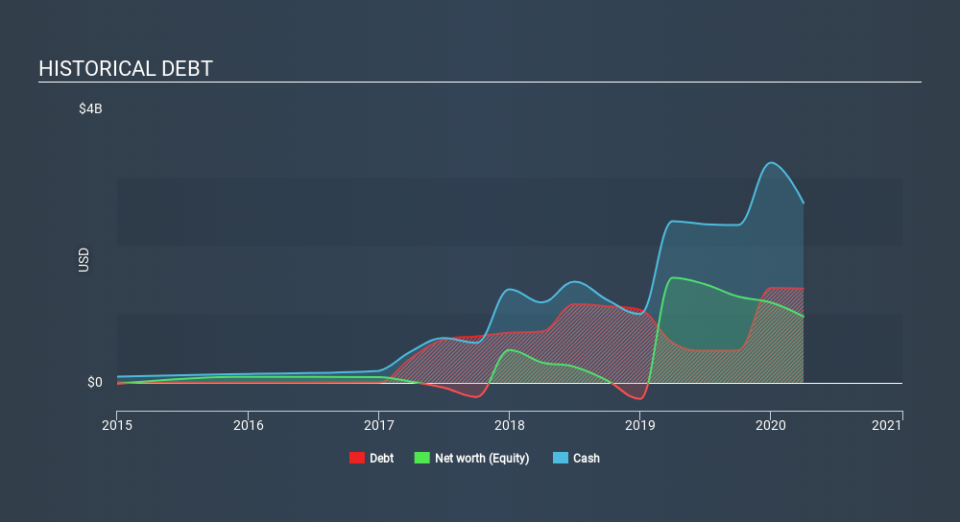Sea (NYSE:SE) Has Debt But No Earnings; Should You Worry?

Warren Buffett famously said, 'Volatility is far from synonymous with risk.' So it seems the smart money knows that debt - which is usually involved in bankruptcies - is a very important factor, when you assess how risky a company is. Importantly, Sea Limited (NYSE:SE) does carry debt. But the more important question is: how much risk is that debt creating?
What Risk Does Debt Bring?
Debt and other liabilities become risky for a business when it cannot easily fulfill those obligations, either with free cash flow or by raising capital at an attractive price. In the worst case scenario, a company can go bankrupt if it cannot pay its creditors. However, a more usual (but still expensive) situation is where a company must dilute shareholders at a cheap share price simply to get debt under control. Of course, plenty of companies use debt to fund growth, without any negative consequences. The first thing to do when considering how much debt a business uses is to look at its cash and debt together.
Check out our latest analysis for Sea
How Much Debt Does Sea Carry?
As you can see below, at the end of March 2020, Sea had US$1.38b of debt, up from US$583.7m a year ago. Click the image for more detail. But on the other hand it also has US$2.63b in cash, leading to a US$1.25b net cash position.
How Strong Is Sea's Balance Sheet?
According to the last reported balance sheet, Sea had liabilities of US$2.43b due within 12 months, and liabilities of US$1.84b due beyond 12 months. On the other hand, it had cash of US$2.63b and US$163.6m worth of receivables due within a year. So its liabilities total US$1.47b more than the combination of its cash and short-term receivables.
Of course, Sea has a titanic market capitalization of US$53.4b, so these liabilities are probably manageable. But there are sufficient liabilities that we would certainly recommend shareholders continue to monitor the balance sheet, going forward. While it does have liabilities worth noting, Sea also has more cash than debt, so we're pretty confident it can manage its debt safely. The balance sheet is clearly the area to focus on when you are analysing debt. But ultimately the future profitability of the business will decide if Sea can strengthen its balance sheet over time. So if you want to see what the professionals think, you might find this free report on analyst profit forecasts to be interesting.
Over 12 months, Sea reported revenue of US$2.5b, which is a gain of 147%, although it did not report any earnings before interest and tax. So there's no doubt that shareholders are cheering for growth
So How Risky Is Sea?
We have no doubt that loss making companies are, in general, riskier than profitable ones. And the fact is that over the last twelve months Sea lost money at the earnings before interest and tax (EBIT) line. Indeed, in that time it burnt through US$346m of cash and made a loss of US$1.1b. But the saving grace is the US$1.25b on the balance sheet. That kitty means the company can keep spending for growth for at least two years, at current rates. Importantly, Sea's revenue growth is hot to trot. High growth pre-profit companies may well be risky, but they can also offer great rewards. There's no doubt that we learn most about debt from the balance sheet. However, not all investment risk resides within the balance sheet - far from it. Case in point: We've spotted 2 warning signs for Sea you should be aware of.
Of course, if you're the type of investor who prefers buying stocks without the burden of debt, then don't hesitate to discover our exclusive list of net cash growth stocks, today.
This article by Simply Wall St is general in nature. It does not constitute a recommendation to buy or sell any stock, and does not take account of your objectives, or your financial situation. We aim to bring you long-term focused analysis driven by fundamental data. Note that our analysis may not factor in the latest price-sensitive company announcements or qualitative material. Simply Wall St has no position in any stocks mentioned.
Have feedback on this article? Concerned about the content? Get in touch with us directly. Alternatively, email editorial-team@simplywallst.com.

